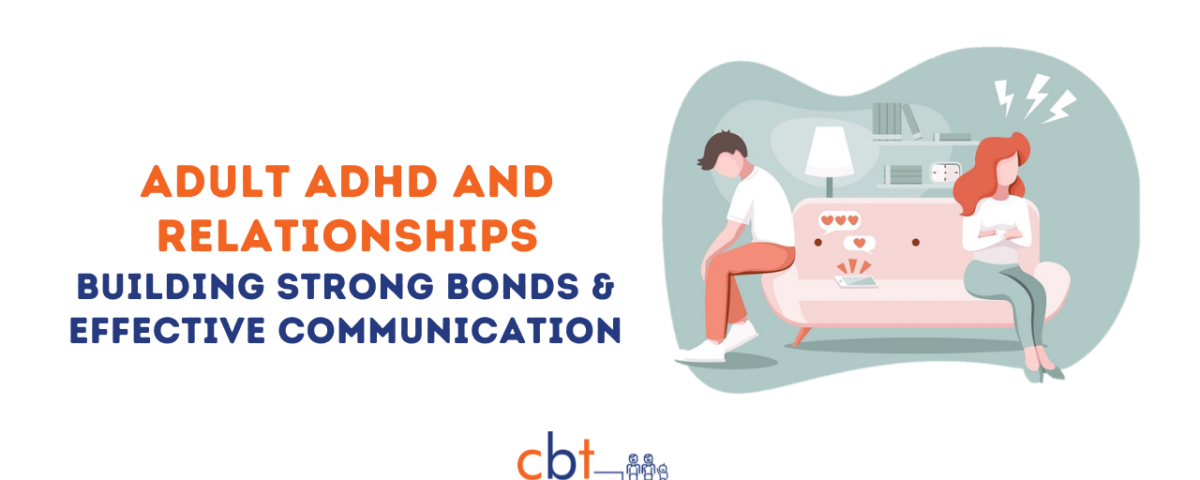Adult ADHD and Relationships: Building Strong Bonds and Effective Communication
Attention Deficit Hyperactivity Disorder (ADHD) is often associated with childhood, but it’s a condition that can persist into adulthood, affecting various aspects of life, including relationships. In this blog, we’ll explore the complexities of adult ADHD in the context of relationships, focusing on strategies for building strong bonds and enhancing communication. From understanding the challenges to embracing the strengths, let’s embark on a journey towards healthier and more fulfilling connections.
Understanding Adult ADHD
ADHD is a neurodevelopmental disorder characterised by difficulties with attention, hyperactivity, and impulsivity. While these symptoms are commonly associated with children, many individuals continue to experience them into adulthood. In adults, ADHD can manifest in different ways, including:
Inattention: Difficulty focusing on tasks, easily distracted, forgetfulness.
Hyperactivity: Restlessness, fidgeting, difficulty staying still.
Impulsivity: Acting without thinking, interrupting others, taking risks.
The Impact on Relationships
Living with adult ADHD can pose unique challenges in relationships. The symptoms of inattention, impulsivity, and hyperactivity can affect communication, intimacy, and overall relationship dynamics. Some common challenges faced by individuals with ADHD and their partners include:
Communication Breakdowns
Difficulty maintaining focus during conversations, impulsively interrupting, or forgetting important details can lead to misunderstandings and frustration.
Time Management Issues
Procrastination, forgetfulness, and difficulty with organization can strain shared responsibilities and lead to conflicts over household tasks or finances.
Emotional Regulation
Impulsivity and mood swings may impact emotional stability, leading to heightened reactivity and conflicts within the relationship.
Intimacy and Connection
Hyperactivity and restlessness can interfere with quality time spent together, while impulsivity may lead to impulsive decisions that affect the relationship’s trust and stability.
Building Strong Bonds
While adult ADHD can present challenges in relationships, it’s essential to recognise that it also brings unique strengths. Individuals with ADHD often possess qualities such as creativity, spontaneity, and enthusiasm, which can enrich the relationship when embraced and channelled positively. Here are some strategies for building strong bonds:
Education and Understanding
Educate yourself and your partner about adult ADHD to foster empathy and understanding. Recognise that ADHD is a neurobiological condition, not a character flaw, and approach challenges with patience and compassion.
Effective Communication
Establish open and honest communication channels within the relationship. Set aside regular time to discuss concerns, express needs, and collaborate on solutions together.
Structure and Routine
Implement structure and routines to help manage ADHD symptoms. Break tasks into smaller, manageable steps, use visual aids or reminders, and establish daily routines to promote organisation and consistency.
Compromise and Flexibility
Practice flexibility and compromise in navigating differences. Be willing to adapt and adjust expectations to accommodate each other’s needs and strengths.
Seek Support
Consider seeking support from a therapist or counsellor who specializes in ADHD and relationships. Therapy can provide valuable tools and strategies for addressing specific challenges and improving communication skills.
Enhancing Communication
Effective communication is the cornerstone of healthy relationships, especially when navigating the complexities of adult ADHD. Here are some communication tips for couples:
Active Listening à Practice active listening by giving your full attention to your partner without interruptions. Validate their feelings and perspectives, even if you disagree.
Use “I” Statements à Express your thoughts and feelings using “I” statements to take ownership of your emotions and avoid blaming or accusing your partner.
Clarify and Summarize à Clarify any misunderstandings by paraphrasing what your partner has said, summarising key points to ensure mutual understanding.
Set Boundaries à Establish clear boundaries and expectations within the relationship to promote respect and mutual understanding. Communicate openly about individual needs and preferences.
Take Breaks When Needed à If tensions escalate during a discussion, take a break to cool off and regroup before revisiting the conversation. Respect each other’s need for space and time to process emotions.
Living with adult ADHD presents unique challenges in relationships, but with understanding, empathy, and effective communication, couples and friends can overcome obstacles and build stronger bonds.
By embracing each other’s strengths, seeking support when needed, and implementing practical strategies for managing symptoms, couples can navigate the complexities of adult ADHD with resilience and grace. Remember, it’s not about erasing the challenges, but about facing them together and growing stronger as a result.
If you or your partner are struggling with adult ADHD in your relationship, consider reaching out to a qualified therapist or counsellor from CBT Professionals, who can provide guidance and assistance tailored to your specific needs. With dedication and perseverance, you can cultivate a relationship that thrives despite the challenges of ADHD.
In conclusion, adult ADHD may present obstacles in relationships, but it also offers opportunities for growth, understanding, and deeper connection. By approaching challenges with empathy, communication, and a willingness to learn and adapt, couples can build a relationship that stands the test of time.
Let’s embark on this journey together, embracing the complexities of adult ADHD and reaching out to foster strong and more resilient relationships along the way.
Reach out today, we can be beside you every step of the way:
Coomera – (07) 5551 0251
Nerang – (07) 5668 3490
Mount Gravatt – (07) 3102 1366
If you, or someone you know, require help, please reach out to organisations like Beyond Blue.
Additionally reach out to these organisations that may be able to help.
• ReachOut (youth mental health service) — online help
• SANE Australia — call 1800 187 263
• Mental Illness Fellowship of Australia (MIFA) — call 1800 985 944
• LifeLine 13 11 14 — for anyone in crisis
(Health Direct, 2020).
THREE CONVENIENT LOCATIONS
MOUNT GRAVATT
Mt Gravatt Medical PrecinctSE 105, 1808 Logan Rd
Upper Mount Gravatt QLD 4122


